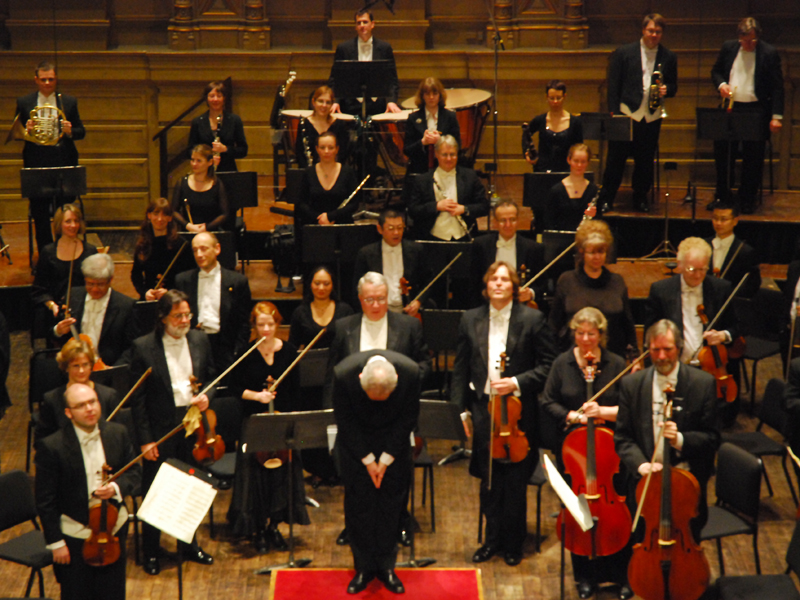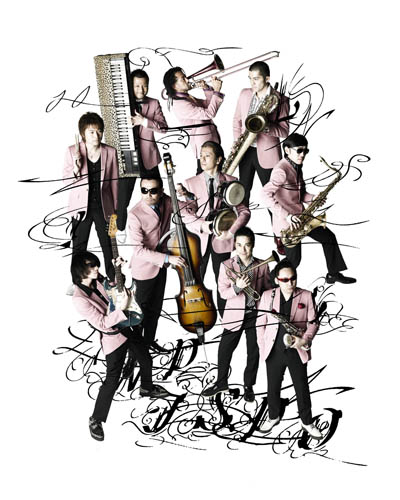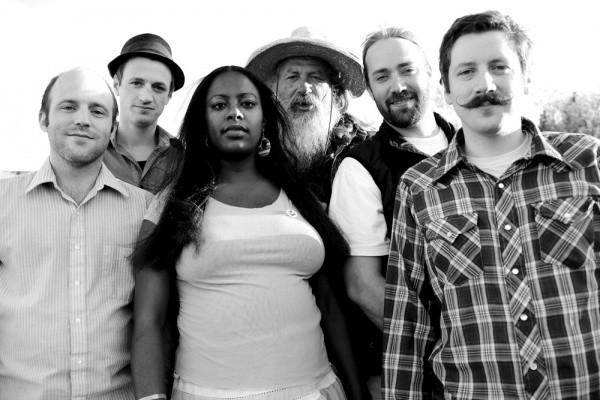A footnote -- or an intermezzo -- in the midst of what I've been saying about how orchestras should talk about themselves. (Here and here.) Whenever I do a post, I look for an image, to give the page at least a little sizzle. So to find one for my last post, I Googled "orchestra," and clicked on "images." The results were ghastly. Utterly boring. Pointless. And these (most, if not all) are official photos released by the orchestra managements. What's the point of them? What do they tell us? An orchestra is made up of musicians, … [Read more...]
Orchestral challenge — second post
In my last post, I urged orchestras not to worry so much about what their audience likes, and to program music they themselves like. Presenting to the world something more vivid, more individual, more compelling than (to paraphrase the kind of language so often found in orchestra publicity) "Tchaikovsky's beloved violin concerto." The concerto, please note, isn't the problem. It's the language used to talk about it. Better to say (if you dared), "The concerto our soloist loves the most, but also the one that drives her crazy because it's … [Read more...]
A challenge for orchestras
Not so long ago, I happened to have dinner with a businessman -- CEO of his not so small company -- who'd been asked to join the board of his local orchestra. His take on the orchestra business, speaking as a businessman: All American orchestras seem to do more or less the same thing, and all of them are in trouble. Therefore the business model doesn't work. Seems simple enough. And a lot of people would agree. But what's being done to change the business model? My suggestion to this man, assuming he did join the board: First make sure … [Read more...]
The relevance trap
All through the US, classical music institutions are searching for relevance. They want to be more relevant to their communities. But I think the word "relevant" is itself a problem. It sends us down a path whose meaning and direction isn't clear. And it reinforces some of the attitudes about classical music and the wider world that got us into trouble in the first place. First problem: If we say we need to be relevant, then we're also saying that -- right now -- we think we're irrelevant. Which means we've defined ourselves as … [Read more...]
Building interest
As I wrote yesterday: There’s one thing that everyone should do. Look at who your fans are now, and find ways to bind them to you very tightly, and to increase their numbers. (The photo-- on the main blog page -- isn't my baby, by the way. You'll find it at the end of this post, where it shows how one of my students loved one piece of music. And how she thought she might find an image to communicate that love.) So -- continuing from where my last post left off -- how can you do this? Well, you’re going to start with whatever fans you have … [Read more...]
How to do it
And so -- resuming my October theme, of building our own audience -- how, exactly, can we do it? (Well, it's November. But of course my schedule was upended by our lovely baby: here and here.] Let me start with some optimism. If you have any audience at all, you can make it bigger. If you believe in yourself, that is, and (of course) if other people want to hear your music. But don't assume they won't! You never know how big an audience you can have until you try to build one. And if you don't believe that anyone wants to hear you, why are … [Read more...]
Classical music diversity — or the lack of it
In my last post, I got up on a soapbox and orated, about classical music -- in practice pretty much a lily-white art -- claiming special privileges (lavish funding, school programs devoted to it) in an age of growing diversity. That seemed ugly to me, and, in the long run, not sustainable. But there's a simpler, less polemical way to look at this. Yesterday, perusing the business section of the New York Times (and in the print paper yet; how old-fashioned of me!), I came across a column that started this way: "Advertisers are increasingly … [Read more...]
Cultural problems with outreach
At the end of my last post, I asked why we're not finding ways to reach the audience of people just like us, who don’t happen to listen to classical music. And why, instead, we put so much effort into education and outreach (often to people not like us). My answer was that we don't believe we can do it. Or at least we're acting that way. We're acting as if we don't think there's an audience we could reach in direct and passionate ways. Which, in my view, condemns classical music to death, for reasons you can read in that previous … [Read more...]
More trouble with outreach
On Twitter I got a passionate objection to my previous post, in which I said that outreach and education -- as a focus for all of us in classical music -- should be replaced by a direct and passionate search for a larger, younger audience. The objection, from a terrific musician in the alt-classical world, was that by going into schools, and otherwise reaching younger people, we can show that being passionate about something, anything really - can change your life. It's about setting an example of passion-driven learning and hard work - and … [Read more...]
The problem with outreach
I hope this post gets some reaction. It's an important challenge -- or at least I think so -- to something many people in classical music deeply believe. We take for granted, in the classical music world, that we need to do outreach. That we need to go into schools and communities, and bring classical music to those who don't normally hear it. We also take for granted that we need to do education, that we need to educate the rest of the world about our beloved art. I won't say these things are bad. And they're certainly fundable. You may … [Read more...]
More testimony
More testimony to the power of what we've been talking about here: Lara Downes, a pianist, posted a comment, sharing her experience raising money on Kickstarter to fund what seems like a terrific CD. Again, it's a story of communication and community, with warm benefits for everyone involved. Thanks, Lara! Here's what she wrote: The experience of running a Kickstarter campaign last winter to raise funds for my new recording “13 WAYS of Looking at the Goldberg” taught me so much about channeling the creativity that goes into developing a new … [Read more...]
Institutions can do it, too
In the past week, people from two orchestras -- one in person, one by email -- have told me about a problem they've had. Both orchestras had some good news, something they felt (and rightly) was truly notable. But they couldn't get press coverage. One orchestra is one of the largest in the US, the other is smaller. I'm not mentioning their names, or what the good news was, because what these orchestras think internally is their own, private business. Their dilemma, though, is something everyone can think about. My answer, to both, was … [Read more...]
Another look at how to do it
My last few posts -- about musicians marketing themselves by using their core values, and about musicians finding their own audience -- have developed into lively conversations, as people comment. If these subjects interest you, and you haven't looked at the comments, you might want to do it. You'll find ideas, experiences, suggestions, and -- because there's more than one way to do all this -- disagreement. I've learned from all of it. And maybe what I like most is that people are sharing their experience. Which gives us case studies, about … [Read more...]
Walking the walk
Here's a comment from pianist Jeffrey Biegel, a long-time reader, on my "Who's Your Audience?" post. I'm putting it out front on the blog, for all to see. And there's not a word i'd want to add. Thanks, Jeffrey! I am so happy to see this topic–I have waited more than 20 years for someone to address this. Since the late 1980s, I have been actively doing what you share. While maintaining an active list of standard repertoire, always exploring neglected works and finally, commissioning new works for piano and orchestra since 1998. With the … [Read more...]
Who’s your audience?
How it usually works in classical music: You (a soloist or member of an ensemble) don't have direct contact with the people who come to hear you. The groups that present you find your audience. How it should be: You find -- and build -- your audience yourself. Or play a big part in doing that. Then you'll have an audience that's really your audience -- fans who'll reliably come to your concerts, donate money, and buy your recordings. Msybe they'll even finance your recordings before you go into the studio. And once you have fans like … [Read more...]













